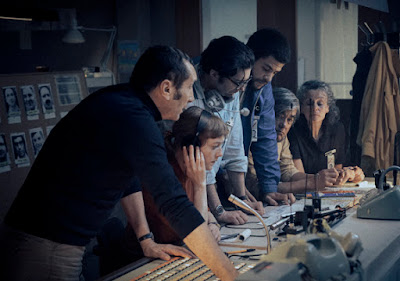Ingenuity under pressure is fascinating.
Director Tim Fehlbaum’s fact-based depiction of what occurred during the 1972 Munich Olympics — and how those events were broadcast to the entire world — is a suspenseful and riveting docudrama: a true, edge-of-the-seat nail-biter.
The suspense derives not from the terrorist attack itself — the details of which are well known, and remain seared into history — but the resourceful, behind-the-scenes scrambling by the ABC News sports broadcasting team, which allowed 900 million global viewers to witness this incident, in real time.
The key phrase in that previous sentence is “sports broadcasting team” ... as opposed to seasoned television news journalists. That distinction heightens this story’s drama.
Events begin quietly, following coverage of events taking place during Day 10 of the Olympics. Newbie coordinating producer Geoffrey Mason (played by John Magaro) is granted the opportunity to helm the next day’s coverage, thanks to a recommendation by Marvin Bader (Ben Chaplin), then vice-president of ABC-TV’s Olympic Operations. They both answer to Roone Arledge (Peter Sarsgaard), then president of ABC Sports (and later president of ABC News, from 1977 to ’98).
World-wide broadcast of the Games has been made possible, for the first time, thanks to new satellite technology.
The “thrill of victory and agony of defeat” sporting events aside, these summer Olympics are hugely important for political reasons: the first Games hosted by a German city since Adolf Hitler’s notorious 1936 Berlin travesty. The 1972 invitation was extended, in part, as a means of giving West Germany an opportunity to showcase its reborn democratic virtues.
This is tremendously important to the ABC team’s German translator, Marianne Gebhardt (Leonie Benesch), who wants the world to see her “new and improved” country.
(Unlike the aforementioned individuals, and a few others, Gebhardt is a fictitious character based on a composite of several translators.)
Everything goes pear-shaped at 4:30 a.m. September 5, when gun shots are heard from within the Olympic Village. They’re followed quickly by reports on the local police radio frequency — which Gebhardt translates — that armed individuals have invaded the quarters of the Israeli Olympic team.
Arledge and his team find themselves perfectly placed to cover this rapidly developing crisis, but his first battle is with ABC News back in the States, which wants to assign its team. Arledge flatly refuses — few actors do controlled anger better than Sarsgaard — insisting that being on the scene, even with a “sports crew,” is more important than playing catch-up from halfway around the world.
But Arledge also is lucky. Veteran ABC News correspondent Peter Jennings (Benjamin Walker) happens to be on hand, having requested a two-week leave of absence in order to join the Munich team as an on-air reporter. He recently worked out of the network’s Middle East bureau, and therefore is familiar with the Palestinian militants, affiliated with Black September, who soon are identified as the captors.
Jennings cautions against using the term “terrorist” on the air, worried that the word itself might worsen the situation.
What follows involves so many moving parts, taking place so rapidly, that the mind spins. 1972 obviously wasn’t the Stone Age, but — compared to modern technology — it may as well have been. No cell phones; only walkie-talkies, sometimes ingeniously spliced — with solder — into land lines. Huge cameras that must be moved on wheels, with cables trailing behind, to keep them connected to the complex control board.
When Mason demands large photos of the hostage Israelis, in order to display them on screen for viewers, a photographer must take pictures of the tiny Olympic badge photos, and then enlarge and develop them in a dark room; this takes time. Text blocks are hand-built, one letter at a time, on a soft board. Logos must be affixed to a camera lens.
Arledge’s most frustrating headache? ABC shares this lone satellite with CBS, and the latter isn’t willing to surrender its time slots for this breaking story. (Which obviously is nuts, in hindsight, but that’s the way it went down.)
The craziest ploy? Suiting up temporary ABC employee Gary Slaughter (Daniel Adeosun) as a member of the U.S. track team, complete with fabricated Olympic badge, in order to have a “runner” who can go back and forth between the TV command center and camera crews in various other parts of Olympic Village, with film cannisters taped to his stomach ... because the Munich police have limited such movement solely to athletes.
(Yes, the actual Slaughter really did that.)
More than once, I was reminded of the spit-and-baling-wire ingenuity that brought the Apollo 13 astronauts back home safely, depicted with similar intensity in director Ron Howard’s 1995 film.
This film’s power comes from the many gob-smacking details re-created by Fehlbaum and his co-scripters — Moritz Binder and Alex David — with respect to how Arledge and Mason stage-managed everything, repeatedly on the run, overcoming all manner of hurdles and limitations.
Markus Förderer’s cinematography evokes the grainy, somewhat dark look of early 1970s television news broadcasts.
I hesitate to reveal anything further, because the sizzle comes from the repeated surprises. Even so, it’s worth noting — with profound sadness — that the Munich police were ill-equipped to handle a crisis of this magnitude. West German law prevented the military from operating within the city, and police officers were given weapons they weren’t trained to use.
The latter is telling, because Gebhardt represents the heart and soul of her country. Benesch’s dismay and stricken expression are palpable, once Gebhardt realizes the significance of what is occurring on West German soil. (Benesch is well remembered for her powerful starring role in 2023’s The Teachers’ Lounge.)
The actual ordeal lasted 20 hours, and every significant detail is conveyed in this riveting 95-minute film: a testament to sharp directing and writing, carefully nuanced acting, and Hansjörg Weißbrich’s taut editing.
It also serves as a grim prologue to 2005’s Munich, Steven Spielberg’s even bleaker drama about what happened next.

No comments:
Post a Comment